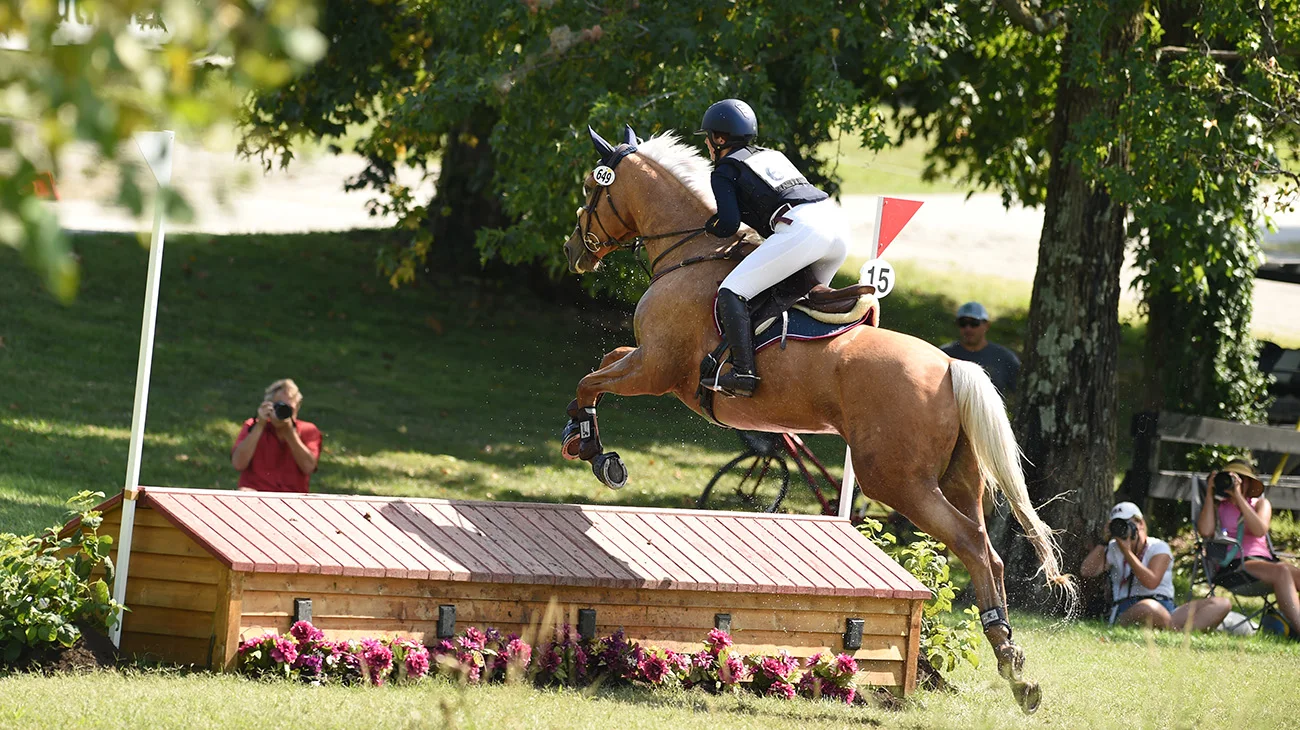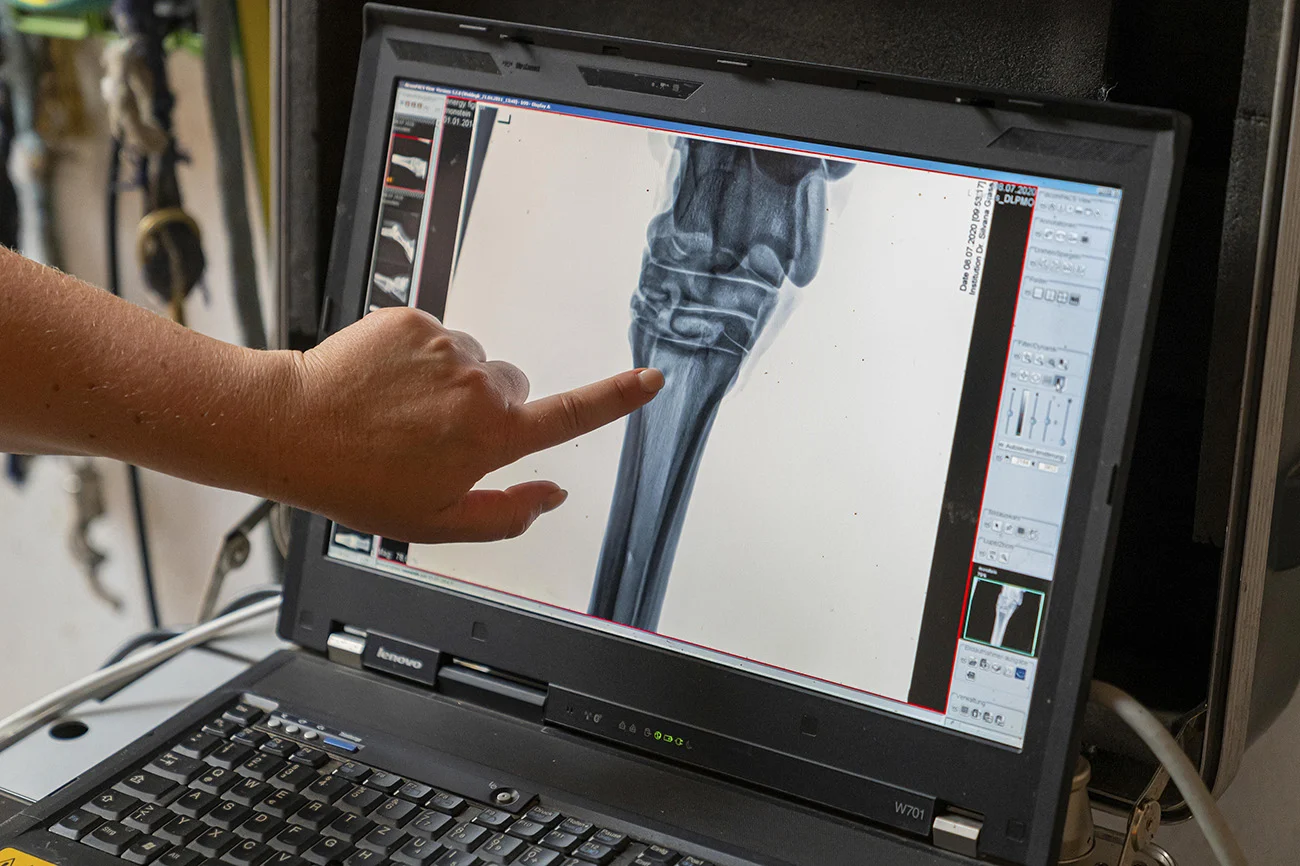Growing up on her family’s horse farm in Canton, Connecticut, Emily van Gemeren became well-versed in the strange and varied ways that horses can incur expensive medical bills. So when, more than a decade ago, her veterinarian recommended an insurance agency to cover the horses owned by van Gemeren and her mother and sister, the family took that advice.
And over those 10 years, insuring their horses proved to be a good decision multiple times over, said van Gemeren. The van Gemerens, who have had policies on about 15 horses in total, made claims based on a range of issues: One horse was diagnosed with an autoimmune disease of the eye; another needed treatment for an extremely rare lung disease; a veterinarian had to be called when a horse’s leg went through a stall window; and one loose horse’s fun ended when he slipped on ice and needed surgery to repair a tendon and ligament.
The family’s myriad claims represent the very randomness of the risks that horse insurance exists to mitigate for owners. In other words, the claims the owners made over their decade of coverage were exactly why they’d dutifully paid into their policies: to cover accidents and issues that even careful horse owners can’t easily predict or prevent.
When the family’s insurance broker called last year, van Gemeren was surprised to learn that her longtime policy would not be renewed—not due to risk based on those previous claims on accidents or illnesses—but because of a factor that hadn’t related to any of their claims to date: eventing.

“The broker called to inform us that the insurance company was no longer covering event horses,” van Gemeren said. “The three of us, over the years, have had a total of 12 event horses of various levels. Some have not competed above novice level, and others have gone up to intermediate-advanced. We had the same company for the last, at least, 10 to 15 years, insuring those horses. So it was definitely a surprise when we found out at our renewal last year that that wasn’t going to happen.”
When van Gemeren learned they would lose all coverage based on her family’s pursuit of eventing, she began the scramble to look for new, affordable coverage for their event horses. But while the rider had hoped to be able to comparison shop for the best policy, she found her options for event horses were surprisingly limited. She ended up coming back to her original broker for help finding a new carrier.
Van Gemeren said she was disappointed to be excluded entirely from coverage through her trusted carrier, and she regretted that the company hadn’t given her an option to limit or exclude claims related to eventing.
“I know eventing is high risk, and I totally get why they would choose not to insure event horses,” van Gemeren said. “But excluding event horses for colic surgery, or mortality coverage, or some other freak thing, just seems a little bit unfair.”
Van Gemeren isn’t alone in her frustration. Many companies are dropping their coverage of event horses altogether, and insurance agents like Amy Daum, an agent with Broadstone Equine Insurance, are in the unenviable position of breaking news to longtime clients that their carriers are no longer offering policies for event horses.
The Shifting Insurance Landscape
Daum, who has been in the horse insurance business for about 25 years, said that in the past few years she’s seen the industry make big changes in coverage around eventing.
Insurance agencies and companies have two distinct roles in insuring horses. On the back end, insurance companies carry the actual policy itself; their underwriters analyze actuarial data around risk and loss to determine changes to policies, rates and deductibles and keep the business profitable. Agents like Daum can access multiple insurance markets, then act as the bridge between horse owners and the company whose policy best fits their needs.
Over the last two years, Daum has observed that more insurance companies are shutting the door on event horses entirely, leaving fewer options for agents and clients to shop.
“Prior to that there were definitely inklings within companies that they were looking at making some shifts,” Daum said. “But over the past two years it has definitely become much more of a solid decision by various companies to make significant changes in their underwriting guidelines.”
ADVERTISEMENT
Of the five insurance companies that Daum works with, only two continue to offer insurance to cover event horses without restrictions. Some companies have continued with limited coverage, placing restrictions on medical and surgical endorsements, or offering mortality alone.
“Most people want that full medical and surgical type of coverage,” she said. “And some companies, especially for event horses, are just not allowing it at all any longer. Eventing has really been the hardest hit that I have seen.”
Restrictions At Every Level
At her policy renewal this year, Laura Strassman, a beginner novice event rider from Groton, Massachusetts, received word from her agent at Broadstone that her policy would not be renewed. Strassman mostly rides her Percheron-cross Fezzik in clinics and trail rides.
“When we do compete, we’re just doing beginner novice,” Strassman said. “I’ve only ever gotten over a couple novice jumps in a lesson in a field. I’ve never done a whole novice course or anything.”
“They could not offer me a single policy that offered me major medical, because I evented—quote, unquote. At that point, he hadn’t been able to do anything. For a year and a half, I hadn’t even been to an event.”
Laura Strassman, beginner novice eventer
What riders like Strassman are finding is that, regardless of their classification or how frequently they compete, eventing at any level has excluded them from coverage. Between recovering from an injury sustained in the field and being treated for asthma, Fezzik required veterinary care that Strassman was able to claim. Those claims were not directly related to their eventing efforts, nor were they factored into the decision not to carry her policy.
“I have no qualms about them eliminating all the conditions he’s had,” Strassman said. “They paid out on that, and when I get new insurance, I know they’re not going to cover that kind of stuff. But for them not to cover an injury sustained in the field because he’s an event horse is insane.”
Many riders like Strassman are frustrated that insurance companies aren’t delineating between their low-level mounts and the upper-level event horses. Why were the companies viewing Fezzik, who had been out of commission for months, as presenting the same level of risk as a horse tackling five-star cross-country?
“They could not offer me a single policy that offered me major medical, because I evented—quote, unquote,” she said. “At that point, he hadn’t been able to do anything. For a year and a half, I hadn’t even been to an event.”
Cindy Anderson, an insurance agent with Blue Bridle, says that she’s seeing more insurance companies disqualify coverage based strictly on the “use” category. When an owner names their horse’s use—like pleasure horse, broodmare, or event horse—the companies typically do not further distinguish levels of risk within that category.
“It’s all based on use, whether it’s beginner novice/elementary to Olympic level,” Anderson said. “It doesn’t matter; it’s based on use.”
Anderson says that, like Daum, she’s seen her market narrow restrictions for event horses. Now, only two of the six companies she works with will offer policies to event horses.
“It’s been coming, but it’s been about the last two years, 18 months, all the carriers that we underwrite with have started to restrict what they can offer event horses,” she said. “Then recently, they’re like, ‘No, we don’t want to do that anymore. Period.’ ”
ADVERTISEMENT
She says that shift is based on the actuarial data, which underwriters analyze to determine losses. They look to the data for patterns related to age, use, breed and value, then they use those patterns to design their policies.
“Unfortunately, the eventing use carries a lot of losses—and not just one particular issue—it’s just all across the board,” said Anderson. “Unfortunately, their losses are a lot for eventing, so that’s why they had to make these changes. Now, we do a bunch of event horses, so we are scrambling as well to try to help these people out.”
Anderson and her colleagues believe that these changes are occurring in large part not due to any recent changes to the eventing sport but because of changes to horse medicine. Breaking veterinary science has created more options for horse owners to treat lameness or elect for complex diagnostics; in turn, the insurance companies are strained by the cost of those new treatments.
“It’s what the vets can do now,” Anderson said. “We didn’t have MRIs before, right? So when you have some of these top horses that come up lame, they’re going to go to the bigger diagnostics, rightfully so. But that’s going to cost you a couple thousand dollars.”

Daum also reflected on how veterinary advances have complicated the insurance market. Over her decades in horse insurance, she’s seen owners increase the amount of diagnostics they claim. Insurance companies have responded by raising premiums and deductibles, or by including sub limits on coverage for diagnostics.
“There just wasn’t nearly the ability to get a lot of diagnostics done, and certainly not the treatments that are available for so many things that are now easily accessible to a lot of people,” Daum said of the shift. “It’s great, because it allows the horse owners to take really good care of the horses, and veterinarians to have a lot of options on how to diagnose and treat, but it does, obviously, then increase the claims that you see and the amount of money that is paid out on claims.”
With the complexity and expense of veterinary treatments on the rise, and actuarial data pointing to eventing as a higher liability, agents predict that event horse owners will continue to see markets changing toward more restrictions.
Daum is grateful that her agency still works with two companies willing to offer reliable coverage for eventing, a sport that is “near and dear to [her] heart.” But she does wonder how those remaining companies will be able to continue to offer coverage while bearing the brunt of the losses that the exiting insurance companies sought to avoid.
“My hope is, and my guess would be, that for eventing horses, we will have markets for quite some time, if not indefinitely—that underwriters will figure out a way to continue to be able to offer coverage,” she said.
For now, she says that while horse owners are not yet in “crisis mode,” event riders like Strassman and van Gemeren will need to dig deeper to find suitable coverage for their horses through the remaining carriers.
“I’m just very grateful that horse insurance exists because it’s made life-saving procedures possible for us in the past,” van Gemeren said. “I just hope it continues to be possible in the future for us event owners and horse owners in general.”
This article originally appeared in the Oct. 30-Nov. 20, 2023, issue of The Chronicle of the Horse. You can subscribe and get online access to a digital version and then enjoy a year of The Chronicle of the Horse and our lifestyle publication, Untacked. If you’re just following COTH online, you’re missing so much great unique content. Each print issue of the Chronicle is full of in-depth competition news, fascinating features, probing looks at issues within the sports of hunter/jumper, eventing and dressage, and stunning photography.














